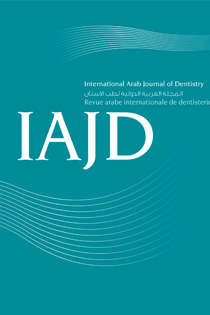Abstract
The aim of the study was to assess the oral heath perception of edentulous patients aged 60 years old and more after treatment with conventional complete denture or implant-supported prostheses. A convenient sample of elderly people was selected from the Department of Prosthodontics at Saint-Joseph University of
Beirut. Subjects were followed six months post-treatment. The treatment possibilities included conventional complete denture, complete acrylic maxillary and/or mandibular denture supported by implant, fixed complete dentures on implant, all-on-four or allon-six. During the interview, sociodemographic characteristics
of the participants were obtained. Oral health related quality of life (OHRQoL) was assessed via the Arabic version of Geriatric Oral Health Assessment Index (GOHAI). During the clinical examination, the prosthetic status of patients before and after treatment was recorded. GOHAI was completed at the date of the
first visit before treatment, 2-3 weeks after treatment, and three and six months after the end of treatment. A significant improvement in the self-perceived oral health for all treatment groups was found; however a better progress was noticed among patients receiving implants-supported prosthesis (p<0.05). Patients with implant-retained dentures had better OHRQoL compared with those with conventional dentures The measure of OHRQoL is an essential tool in treatment planning. By taking into account the self-perception of oral health, the practitioner will respond to the patient expectation. A controlled randomized clinical trial should be conducted to confirm the present results.

